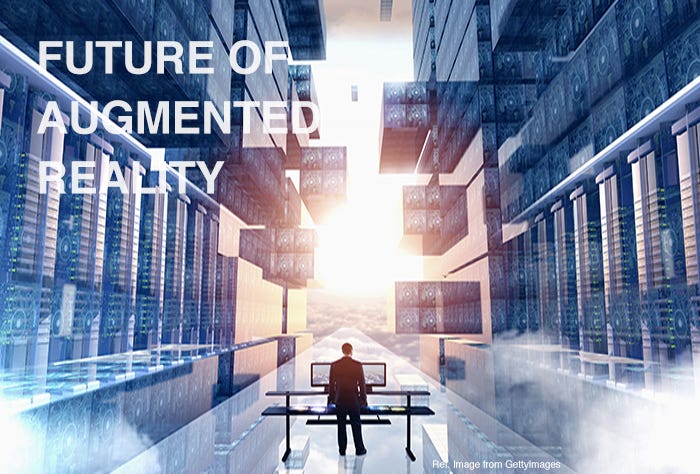Augmented Reality in 2075 A.D
This is a work of fiction and bears little relevance to reality 🙂
Augmented Reality has come a long way since it was invented in 1992 at the United States Air Force Research Laboratory. Like most inventions, it has become so integral that it is rarely recognised as an achievement at all. That is natural, after all, if we were in 2020, we would fail to appreciate the invention of electricity in 1819–1820. I find it’s history most amusing. Case studies suggest that back in 2015 there were people who believed that augmented reality would never take off.

The first time augmented reality was used in the Gaming Industry was in 1998 for a yellow “ first down” line in football. The gaming industry used to be the largest consumers of AR before the famous Glass Resolution Act in 2050. Prior to that, it was a little known fact that glass was made from liquid sand. Various Glass Industries started the accumulation of the non-renewable resource. The gaming industry in the USA foresaw the possibility of losing the market which resulted in various tie-ups. This prevented investors from investing in futuristic projects and caused an uproar before The UN issued the arrangement that every industry should get equal shares of sand. A whopping amount was dedicated to finding alternatives in order to produce glass. The sum was never divulged but Augmented Reality has since enjoyed space in various industries.

The gaming industry is still one of the more popular customers of AR but healthcare, tourism and other government-sponsored initiatives are taking over. It is because of Augmented reality or mixed reality that every household can enjoy the warmth of the sunshine through their windows at their preferred temperature. They can choose what city they wish to see when they look outside their window, customise sounds they wish to hear. Our ancestors had to physically unlock their phones, their doors and their cars. Driving, apparently had to be done manually too causing nearly 1.25 million deaths every year due to road accidents for the most of part of 21st century. We do not recognise the privilege that our technological development provides. Our cars are currently controlled by AI’s who use Augmented Reality to ascertain proximities and variants, we need not be subjected to the whims of our drivers ( in case we chose to not drive ourselves) we can enjoy that time to ourselves. We can catch up on our sleep, our tasks, have time to eat. We can only imagine how hectic life would have been for our ancestors who, like us, had only 24 hours to themselves every day.
The travel industry too has seen a spectrum of change since the emergence of Augmented Reality. Countries have been forced to upgrade their infrastructure because of global competition. We can enjoy an overview of our future travels. All we need to do is ask our AI’s to present the scenario of the country and the particular place we intend to go to. We are wiser tourists, our AR’s now help us to live and experience glimpses of tourist destinations. Since the practice was misutilised by several companies as a substitute for actual travelling, several tourist-friendly nations have limited the AR-VR experience to 5% This led to the flourishing of the tourism industry as they acted as an advertisement without disclosing the entire experience.

In 2050, the entire world, all of the five continents ( seven at that time) were apprehensive of yet another water crisis that could befall them. Several continents had to merge together to solve the pressing issue and prevent World War 3 from breaking out. ‘Sitio diebus’ or days of thirst was solved no sooner than the early 30th century. Various Educational Institutes such as RSW ( Reserve and Save Water) and WWW ( We, Wellness and Water) were launched by the government to teach children how valuable water is. The government utilised the ancient popular method of using printed and digital art as a form of instruction and gave it a twist. ARART — Augmented Reality Art was used in the form of games and lessons where the more fortunate people were made to virtually experience the scarcity that met with the rest of the world. The water balls for potable water was made mandatory and the resource was rationed till the crisis seemingly ended.
As a generation of people who are used to comfort and ease, we forget to appreciate the little inventions which made us who we are today. Augmented reality helps us not only in our daily lives but is also the reason why we are here today. Alive, better- rested and better fed than our struggling ancestors. Happy Xtended Reality Day, more popularly known as M-A-V-R Day [Mixed — Augmented — Virtual Reality] to you all!
This is fiction article from InfiVR.com and these are our personal thoughts only.
-From one of the leading Bestseller Author (in 2075)
Ms. Shreya Chakraborty